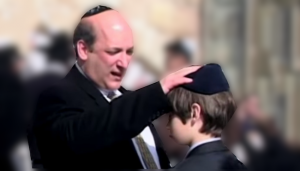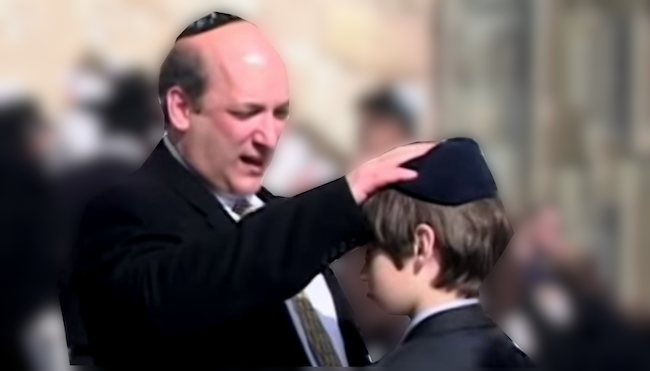
Friday Night
IT’S THE LAST parsha of the Torah, and it’s about the brochos that Moshe Rabbeinu bestowed upon the 12 Tribes just prior to his death at the end of the parsha. And just like the brochos that Ya’akov Avinu gave to his 12 sons at the end of Parashas Vayechi, they make no sense to us. Thank God for Rashi.
Even if we say that these brochos are different, more like prophecy, they’re still amazingly obscure. One can almost imagine the Jewish people listening to Moshe Rabbeinu saying them and scratching their heads saying, “Doesn’t anyone understand what any of this means?” Someone might have answered, “Don’t worry, in about 2,000 years, Rashi will be born and explain all of it!”
Why couldn’t Moshe have just given simpler and easier to understand blessings? I know that when we give blessings these days, we bless the person to get what they want…or need. Isn’t that what blessings are all about?
Wait a second. If that is what blessings are all about, then how do we bless God? There is nothing He needs or wants that He doesn’t already have, or could give Himself if He didn’t. And if He couldn’t give it to Himself, which is not possible, then how could we given it to Him since everything we have comes from Him?
The Nefesh HaChaim deals with this question in Sha’ar 2. He explains that the idea of a brochah, like the word breichah—stream—is a flow, a breichah being stream a flow of water in a breichah and a brochah being a channel for a flow of Divine light. When we bless God, we’re really saying that He should increase His flow of light into the world and thereby increase the revelation of His Reality.
This is why the word brochah begins with a Bais, which equals two. Two may not be much, but it symbolizes a lot, literally. One is, well, only one. But two is already more than one, on the way to become a lot more than, like three, four, etc. The concept of a brochah is the idea of praying that the recipient of the brochah, or God, receive more of something.
And not just of any something, but of something good. As the expression goes, “Be careful what you wish for because you just might get it.” What does that mean? If a person didn’t want something, why would they wish for it? Because, as life so often has shown us, what we think we want is not always what we really want, in the long run. Sometimes dreams can become nightmares and blessings, curses.
This is why some people, when asking for something, stipulate, “…but only if it is good for me.” This is also why people run to tzaddikim for brochos. They figure that a tzaddik has God’s ear, and that nothing bad can come through them. This way they will hopefully get what they want, and only if it is good for them.
Shabbos Day
SO WHAT CAN God have more of if He is missing nothing? Revelation. When we bless God, we’re really saying, “It should be that Your Reality should be increased in Creation,” meaning that people should become more aware of it. Clearly that can always stand to be increased.
But if everything that exists is a function of God’s will, then He is always here if only vis-a-vis everything He has created. Rather, it’s only man’s ability to see this, relate to it, and be real with it that has to be increased. So what we’re really saying is that it should be that man should wake up to His existence and running of history. But if so, then that blessing should be given to mankind, not God.
Yes, and no. Yes, because it is really up to man to make the world a better place so that God will be willing to reveal Himself more. But no, because after almost six millennia of history, man seems no closer to increasing God’s Presence in Creation and, if anything, seems only too willing to push Him further out of the picture. So we’re really asking God, when we bless Him, for help with the kind of Divine Providence that makes it happen, i.e., miracles.
But even miracles aren’t enough proof. When God split the sea, every last Jew knew it was Him and was in awe. Pharaoh and the Egyptian army however thought it was their god laying a trap for the Jewish people and ran right into the dry sea after them. Only after being tsunamied out of existence could they realize their fatal error.
And that was already witnessing the destruction of Egypt through 10 plagues. Pharaoh had already admitted that the plagues were from God, and that’s why he allowed the Jewish people to leave Egypt to serve Him. Why would he all of a sudden have a change of mind and heart and think that it was his god splitting the sea, and not the same God who did the plagues for the Jewish people?
The Torah hints to the answer here:
Speak to the Children of Israel, and let them turn back and encamp in front of Pi HaChiros, between Migdol and the sea, in front of Ba’al Tzephon… (Shemos 14:2)
And let them turn back: To their rear. They approached nearer to Egypt during the entire third day in order to mislead Pharaoh, so that he would say, “They are astray on the road,” as it says: “And Pharaoh will say about the Children of Israel…” (Shemos 14:3). In front of Ba’al Tzephon: This was left from all the Egyptian gods in order to mislead them, so they would say that their god is powerful. Concerning this [tactic] Iyov said: “He misleads nations and destroys them” (Iyov 12:23). (Rashi)
In other words, it’s hard to believe that God is working on behalf of the Jewish people, or at all, if the Jewish people look weak and confused. It’s like watching the child of a rich person struggle financially. We just assume that there is no real relationship between the two of them, or the parent would help their child out. We don’t realize there might be other circumstances involved.
Seudas Shlishis
THIS BRINGS US back to Moshe’s blessings in this week’s parsha. He wasn’t just saying goodbye and wishing them good lives. He was telling that each tribe was an integral piece of a historic puzzle that had to find its proper place so that the world could function and reach its ultimate goal. When he blessed them, he gave them prophetic insight in how to achieve this, and a flow of light to help them hit their spiritual mark.
It didn’t even really matter if they understood what he said, though it helped. Saying the words was like pressing numbers on a lock. Certain numbers in a certain sequence unlock the safe, regardless of understanding how or why. The lock was pre-programmed to respond to both.
By fulfilling the purpose of each tribe, the purpose of the Jewish people would be completed as well. This would transform the spiritual environment and makes it easier for the entire world to see God in it and running it. We would become the completed keli, the vessel and channel for Divine light to flow into the world to fulfill the words, “God will be King over the entire world. On that day, God will be One and His Name, One” (Zechariah 14:9).
Every Jewish person living today descends from either the tribe of Yehudah, Binyomin, or Levi. The ten tribes that were exiled before the destruction of the Temple remain missing, whatever that means. But it doesn’t mean that the mission no longer applies, or that we should not be trying to figure out how we can personally help the Jewish people as whole fulfill their ultimate destiny.
A person can take the first step of asking God for help. He made us, and for a very specific purpose, even if we have yet to become aware of it. You can pray for a bigger house, or a raise in salary, etc. But you’re more likely to get answered if you realize the biggest blessing you can ever get is the one to be who you were created to be, and to accomplish what you were born to accomplish.
Ain Od Milvado, Part 67 (Simchas Torah)
UNTIL NOW WE have basically focused on seeing God as the only one responsible for all that exists or happens. However, the fact that this parsha always comes out on Simchas Torah gives us an opportunity to discuss the role of Torah in all of this.
When you love someone, you love what they love too. Automatically what is dear to them becomes dear to you. Granted, when it comes to human beings this rule can break down because it is possible to love them, but not everything about them. Even close spouses can have some different interests that do not appeal to the other spouse.
But this is not true when it comes to God, and certainly not true when it comes His Torah. Torah is not just a User’s Manual God had printed for man so he could make the most out of life. It is a collection of all the ideas that God holds dearest, albeit in a much watered down version for us. Kabbalah even goes so far as to say that God and His Torah are one.
That’s why when we celebrate Torah being in our midst on Simchas Torah, we’re not just celebrating Torah. We’re celebrating God being in our midst, and to the extent that a person does is the extent to which they can feel the truth of this. By the look on the faces of some people who really get into the simchah of Torah, they feel exactly what this means.
This makes our love of Torah a part of ain od Milvado. Just like God is everything, Torah is everything, meaning that nothing else matters but the learning and performing of Torah. As the Nefesh HaChaim explains, this means that even when you have to be involved in mundane matters, it has to be with a Torah perspective and outlook. It’s how a person can turn such mundane matters into mitzvos and part of Torah. My brochah to you (and myself) is that you should be able to achieve this on Simchas Torah, and the rest of the days of your life, b”H.
Chag Samayach,
Pinchas Winston


